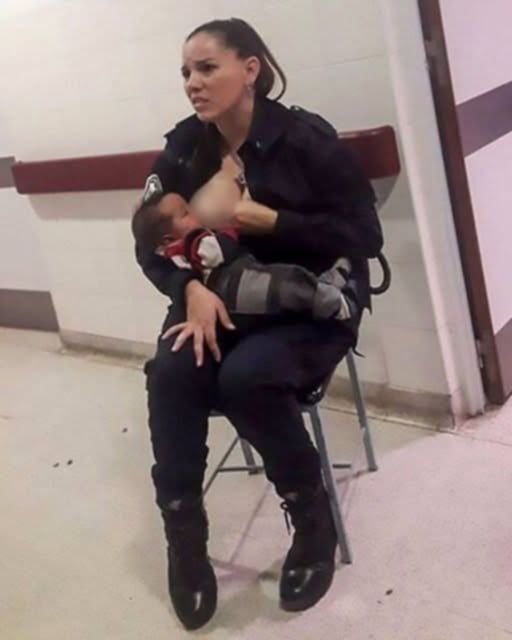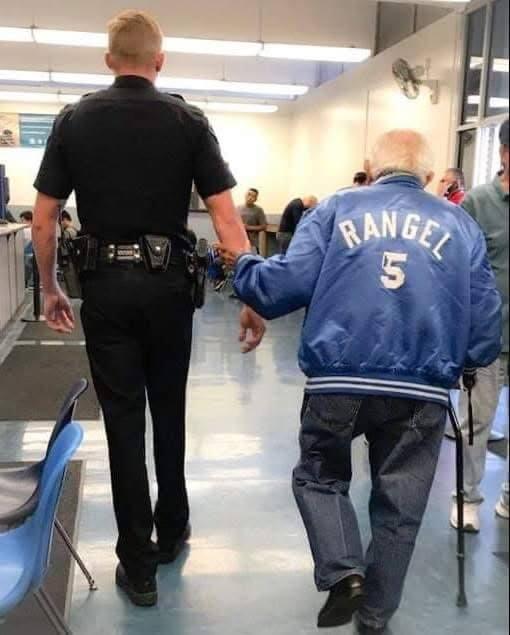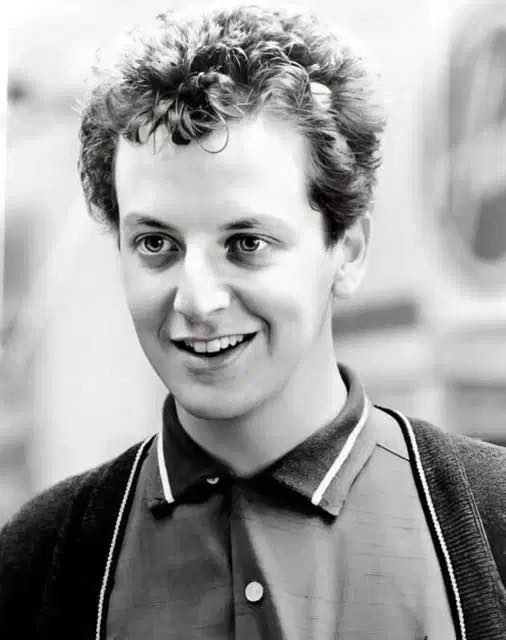I FOUND A STARVING BABY ON DUTY, AND I COULDNT JUST WALK AWAY
It started as an ordinary day on duty—patrolling the streets, answering calls, doing my job. Nothing could have prepared me for the moments that shattered my heart that day.
We received a call about a distraught woman wandering near the hospital entrance. By the time we arrived, she had vanished, but what she left behind was far more devastating—a baby.
There he was: tiny and fragile, wrapped in worn, ill-fitting clothes. His cries were weak and desperate, echoing in the sterile hallway. A nurse later explained that he had been crying for hours, left without food and abandoned, and there was no sign of his mother anywhere. In that moment, I felt a familiar pain—as if I were hearing the echo of my own child’s cries at home.
Without a second thought, my instincts took over. I found a chair, quickly adjusted my uniform, and scooped the baby into my arms. Almost immediately, his little hands reached out, gripping my vest as he latched on as if seeking comfort. Around me, nurses, patients, and fellow officers paused, watching the scene unfold, but in that instant, nothing else mattered. This baby needed warmth, nourishment, and love—and I was the only one there to provide it.
I cradled him gently as he fed, my heart aching with questions: Where was his mother? Was she safe? Would she ever return for him? And if she didn’t—what fate awaited him?
Days turned into weeks, and no one came forward to claim the baby. Social services eventually named him Oliver—a simple, common name that somehow suited his wide, curious eyes, as if he were silently trying to absorb every detail of this new, bewildering world. Initially, my visits were just part of the ongoing investigation, a way to gather leads about his mother. But soon, caring for Oliver became personal. He wasn’t like other infants; while most babies would fuss with every change or adjustment, Oliver remained serene and almost grateful, as if his heart recognized genuine care when it received it.
At home, my wife, Lila, noticed the change in me. “You’ve been spending a lot of time at the station,” she remarked one evening while we folded laundry, our daughter Mia quietly stacking blocks nearby. “I’m just following up on a case,” I replied, unable to admit that my thoughts were constantly with Oliver, whose loneliness pained me deeply and reminded me of Mia when she was small. Lila’s knowing glance, filled with silent support, reassured me—she always understood without prying.
One night, after a grueling shift, I found myself drawn back to the hospital again. It wasn’t mandated by protocol, but by now everyone knew that Officer Carter had a soft spot for the abandoned baby. In the dim light of the nursery, where a single crescent-moon-shaped nightlight cast gentle shadows, I discovered Oliver awake in his crib. His face lit up the moment he saw me, and he kicked his legs in joyful anticipation while softly cooing and reaching out. “You’re growing stronger every day, aren’t you?” I whispered as I lifted him gently. His tiny fingers wrapped around mine, and for a brief moment, I fought back tears—tears that I felt I shouldn’t shed as a cop. But in that tender embrace, the barriers fell away, and I allowed my heart to feel the depth of it all.
Then, unexpectedly, a young woman appeared in the doorway. Her face was pale, hair unkempt, and her clothes disheveled, as if she’d just emerged from a long night of struggle. For a moment, I prepared myself for her to flee. “Can I help you?” I asked cautiously, instinctively clutching Oliver closer.
In a voice barely above a whisper, she asked, “Is… is that my son?” Her name was Elena, and her story was one of heart-wrenching despair. Elena had been forced to live out of her car for months after losing her job; when her son, born prematurely, arrived, she couldn’t afford the necessary medical care. Overwhelmed by fear and desperation, she left him at the hospital, praying that someone would provide the care she felt incapable of giving him.
Later that evening, as we sat together in a quiet corner of the hospital cafeteria with cups of stale coffee between us, she confessed tearfully, “I thought he’d die because of me. I believed that leaving him was the best I could do.” I listened, silently knowing that the struggles of parenthood are daunting under even the best circumstances. Under her conditions, the challenges were nearly insurmountable.
“What happens now?” she asked anxiously, wringing her hands. I explained honestly, “That decision is yours. If you choose to reclaim him, social services will help—providing housing, resources, everything you need—but you’ll have to prove that you can care for him.” With a determined nod, Elena promised, “I’ll do whatever it takes.”
Over the ensuing months, Elena worked tirelessly to rebuild her life. With the support of social workers, community programs, and local charities, she managed to secure stable housing and even landed a part-time job. Oliver remained in temporary foster care until the day came for their reunion. I continued to visit whenever I could—bringing him toys, reading stories, and singing silly songs that made him burst into joyful giggles. Every visit was bittersweet, knowing that each goodbye might be the last time I held him, yet every moment also reaffirmed hope for Elena’s transformation and Oliver’s future.
Finally, the day arrived for their long-awaited reunion. I accompanied Elena and Oliver to the courthouse as they stood together, embracing tightly in a moment that overflowed with tears, relief, and unspoken gratitude. Later that evening, Elena thanked me over and over. “I don’t know what I would’ve done without you,” she said earnestly. I could only shake my head, humbled by her words. “No, Elena—you saved yourself. I simply helped you find your way.”
Time marched on, and life gradually regained a semblance of normalcy. One Saturday morning, as I was opening the door to our home, I was surprised to see Elena returning with little Oliver, now a cheerful toddler. He ran into my arms with a wide grin, and Elena handed me a small canvas bag. Inside, nestled among soft fabrics, was a handmade quilt stitched with stars, moons, and tiny footprints. On the back, in delicate cursive, were the words: Thank you for being our guiding light. Overcome with emotion, I smiled through my tears. “This is beautiful,” I whispered, deeply touched.
As they waved goodbye, I draped the quilt over our couch, a tangible reminder of the unexpected journey that had begun with a desperate cry in a hospital corridor. Lila joined me, teasing gently, “Looks like you’ve earned another member of your fan club,” as Mia snuggled up on the quilt, pretending it was her secret fort.
Reflecting on everything that had transpired, I realized that being a good cop wasn’t just about solving cases or catching criminals—it was about being there when people needed you most. That day, by simply showing up and caring, I had helped to transform two lives. Kindness has an astonishing way of coming back around.
So next time you see someone struggling—whether it’s a vulnerable child, a desperate parent, or a neighbor battling life’s storms—don’t walk by. Pause, offer your support, and remember that even the smallest acts of love can ripple outward, changing lives in ways you may never fully comprehend.
If this story resonated with you, please share it. Let it remind us all that sincerity should never be dismissed, and that compassion, in its purest form, has the power to heal and transform.






